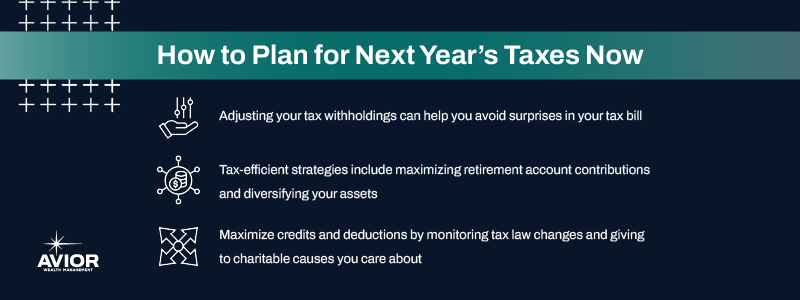How to Plan for Next Year’s Taxes Now
Being proactive with your taxes is always going to help you stay organized and maximize your tax minimization opportunities

Staying proactive with tax planning is key to maximizing your savings and following all laws and regulations. But many Americans put off their taxes until the last minute, which can lead to missed savings opportunities or tax penalties.
Getting a head start on next year’s taxes can only benefit you. You’ll be able to monitor tax laws, make withholding adjustments, and improve your recordkeeping practices so you’re more prepared when the time comes. Plan for next year now to optimize your situation and reduce tax-related stress.
Adjusting tax withholdings
Adjusting your withholdings allows you to align the amount of taxes withheld from your income with your anticipated tax liabilities. This strategy ensures that you neither overpay nor underpay taxes throughout the year. The goal is to have your withholdings match your expected tax liability, avoiding a large tax bill when you file your tax return.
Begin by assessing your current tax withholdings. This information is typically found on your pay stub or in your online payroll system.
The IRS provides an online withholding estimator that helps you calculate the appropriate amount of federal income tax to withhold from your pay. This tool accounts for your income, deductions, and credits.
Based on the results from the withholding estimator, complete a new Form W-4 and submit it to your employer. The W-4 allows you to specify the number of allowances and additional amounts to be withheld from each paycheck. If applicable, consider adjusting your state tax withholdings as well.
You may consider adjusting your tax withholdings when you go through a life change, like a marriage or divorce, children, employment change, home purchase, or change in income.
Implementing tax-efficient investment strategies
Planning ahead also means factoring taxes into your investment decisions. Asset allocation techniques and saving within tax-advantageous accounts can help you take control of your tax strategy for next year and the years to come.
A few tips for rebalancing your portfolio in a tax-efficient way include:
- Diversifying your assets across different classes and account types
- Taking advantage of tax-loss harvesting, where you offset capital gains with losses
- Being strategic about when you sell investments or recognize capital gains
- Maximizing your annual contributions to tax-advantageous retirement accounts such as 401(k)s and IRAs
- Working with a financial advisor who will help you integrate tactics you may be unaware of
Implementing these strategies now will help you ensure you’re on the right track during the next tax season. Being mindful requires carefully balancing investment types and understanding the tax implications of each asset class.
Maximizing your deductions and credits
Next, consider how to maximize your deductions and credits to take advantage of available incentives. Tax laws are subject to change, and new deductions or credits may become available each year, so stay informed about updates and changes to tax regulations so you’re aware of all potential benefits.
Familiarize yourself with the eligibility criteria for specific deductions and credits. Some may be income-dependent, for example.
To maximize your deductions and credits, consider:
- Giving charitable donations and keeping detailed records of your donations. Consider setting up a systematic approach, such as monthly donations, to support your favorite causes.
- Track eligible expenses, such as tuition, fees, and textbooks, to take advantage of education-related tax credits. This is particularly beneficial if you’re pursuing higher education or supporting dependents in their educational endeavors.
- Invest in energy-efficient home improvements to qualify for tax credits. This could include upgrading insulation, installing energy-efficient windows, or incorporating solar energy systems. Check the eligibility criteria and ensure that the improvements meet the required standards.
- If you own a home, explore deductions related to mortgage interest, property taxes, and home office expenses.
- If you operate a small business, be aware of the deductions available for business expenses, home office use, and eligible equipment purchases.
Making time to be strategic will only pay off. These efforts can lead to substantial tax savings come tax-filing season.
Implementing effective recordkeeping practices
Successful tax planning can’t happen without staying organized and properly managing your financial records. By being diligent now, you’ll be setting yourself up for an easier tax planning and filing process later.
Consider using digital expense tracking tools so you can capture receipts on your mobile device and organize everything in one place. Store digital copies of receipts and tax documents in cloud-based systems for secure and accessible recordkeeping. Another best practice is to maintain separate bank accounts and credit cards for personal and business use to simplify tracking and categorization of transactions.
Establish a routine for consistent bookkeeping to reduce the workload during tax season and ensure accurate financial records. Invest in accounting software for automated financial tasks, simplified recordkeeping, and easy tax preparation.
Implement a systematic filing system for physical documents, categorizing and storing them for easy retrieval when needed. Set up calendar reminders for important tax-related dates to stay organized and avoid missing deadlines.
Planning for significant life events
Major life changes can impact your taxes and tax recordkeeping requirements. Events such as marital changes, starting a business, moving, having children, changing jobs, changing health insurance, or receiving an inheritance could all significantly change your tax liability.
Continue to review your tax filing status, make withholding adjustments, claim tax credits, leverage deductions, and review asset allocations for areas that need alterations.
Planning for a smoother tax season with Avior
It’s never too early to start planning for taxes. By considering all these strategies and implementing better recordkeeping strategies, you’re setting yourself and your family up for success.
Avior Wealth Management is here to help you implement tax planning best practices and continue to prioritize your future goals. Get in touch with Avior to find out more about our services.
Disclaimer: Nothing contained herein should be construed as legal or tax advice. Avior and our Advisors will work with your attorney and/or tax professional to assist with your legal and tax strategies. Please consult your attorney or tax professional with specific legal and/or tax questions. Investment Management and Financial Planner are offered through Avior Wealth Management, LLC, an SEC-registered investment advisor. Past performance is not a guarantee of future results. Investments are subject to loss, including the loss of principal.
No Comments
Sorry, the comment form is closed at this time.




